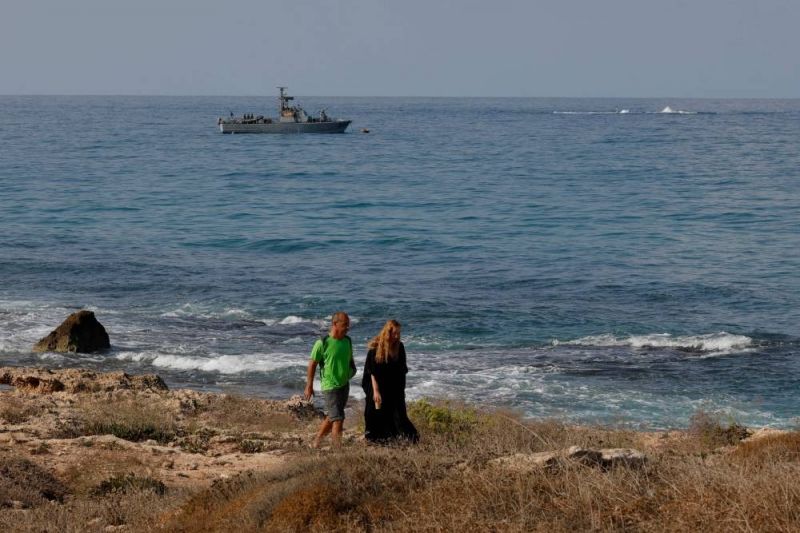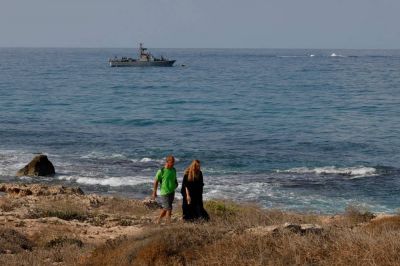
An Israeli navy ship on patrol in the Mediterranean waters near the Lebanese village of Ras al-Naqoura, South Lebanon, on October 7, 2022. (Credit: Jalaa Marey/AFP)
France called on Lebanon and Israel Saturday to "work" to reach an agreement on the delineation of their maritime border, and assured it is "actively contributing" to the American-led indirect negotiations between the two states.
On Thursday, Israel rejected Beirut's amendments to the draft agreement proposed by the US emissary Amos Hochstein. While the Israeli rejection has still not been officially transmitted to Washington and then to Lebanon, this development, which was leaked to the press, seems to dampen hopes that an agreement will be reached before the end of Lebanese President Michel Aoun's term on Oct. 31. Israeli legislative elections are also coming up in early November.
'Beneficial' agreement
"France is actively contributing to the US mediation aimed at finding an agreement on the maritime border between Israel and Lebanon," said a spokesperson for the French Ministry of Foreign Affairs. The statement also said "an agreement would be beneficial to both countries and their populations, and would contribute to the stability and prosperity of the region.
"We call on all actors to work towards it," the ministry pleaded.
For now, Lebanese officials are waiting to receive and dissect the Israeli response before taking an official position.
"Lebanon is not concerned about media leaks, but about facts that should be communicated by the American delegation, which is the only party we are talking to," Parliament Speaker Nabih Berri said Friday during an interview with Asharq al-Awsat newspaper.
Berri said Lebanon is waiting for the formal, written version of the Israeli reaction. When that response is received, "we will act accordingly," he added.
Hezbollah, which plays a behind-the-scenes but key role in the process, says it is waiting to examine the details of Israel's response and then that of Lebanese officials before commenting. The Shiite party's general secretary, Hassan Nasrallah, is expected to comment on the issue during a live speech Oct. 11.
In its proposed amendments, Lebanon refused to recognize the "line of buoys," the border delimiting the exclusive economic zones (EEZ) of both countries. This line extends for 6 kilometers before joining Line 23 claimed by Lebanon.
According to Israeli media, Lebanon requested refer to the line of buoys as a "de facto" line instead of the "status quo," which Israel rejected. Another point rejected by the Tel Aviv was the modalities for compensation to Israel for the part of the Qana gas field that extends south of by Line 23. It is planned that one of the companies in the consortium in charge of the exploration and exploitation of offshore gas in Lebanon's EEZ will act as an intermediary by paying a lump sum to the Israeli side.
Amid the confusion, one certainty emerges: Hezbollah, which imposed these two amendments, is not about to backtrack on its decision, according to experts interviewed by L'Orient-Le Jour.
In the meantime, Lebanese officials are trying to temporize and minimize the effects of the Israeli refusal.

